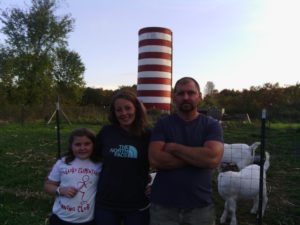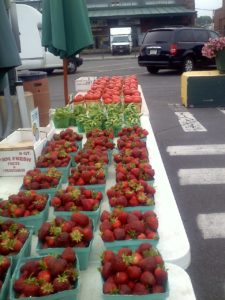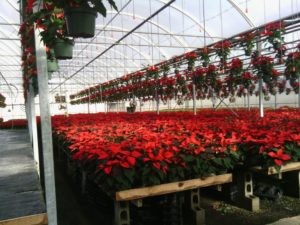Grounded: Military Veterans Turn to Farming
January 12, 2015/
Organizations in New York State and beyond are building capacity to help military veterans put their skills to work growing and producing food.
By Sarah Nechamen
Tom Bryant grew up visiting his grandparents’ farm every weekend, taking care of the chickens as a part time job. After serving four years in the United States Air Force and four more in the Navy Reserve, he started eyeing the farming lifestyle once again, anticipating that the calming effect of caring for plants and animals would help him cope with his post-traumatic stress disorder.
Tom started out by taking a beginning farmers class hosted by Cornell Cooperative Extension to fill in any gaps in his agricultural knowledge that weren’t covered by his childhood farming experiences and his life-long passion for gardening. Soon after, Onondaga farmers donated five acres of land near Syracuse and Tom was able to officially embark on his new career as a farmer.
Tom’s story is surprisingly common for American veterans; nearly half of military recruits come from rural farming communities. As one farmer-veteran put it, “When I was being shot at in Afghanistan, I kept thinking to myself how peaceful it would be to work on a farm!”
It is for this reason that a number of programs have been launched recently to support veterans interested in pursuing careers in agriculture. One of these programs is VetFarms, founded by Tom Bryant himself soon after he took that first beginning farmers class.
When asked why he, as a farmer veteran, decided to go a step farther and help bring other veterans into farming as well, Tom laughed. “Well, I didn’t want to farm alone!”
Tom went on to explain that he was already experienced placing veterans in welding jobs as a BOCES instructor so it was an easy jump for him to start placing those same people on a farm instead. Plus, he needed labor on his new five acre farm.
Soon enough veterans were working Tom’s fields in Onondaga County, growing everything from turnips to pumpkins. Tom enlisted the help of several other farms, including Schader Farms in Williamstown and Grindstone Farms in Pulaski, so that farmer veterans could get experience farming with a variety of land and crops. The crops harvested from this collection of farms were then sold at Syracuse’s Regional Market.
By the time they graduate from the VetFarms program, participants have learned when and how to plant and harvest, how to market their product, and proper machinery practices so they can stay safe through the process. Tom has veterans of his program from the Finger Lakes region to North Lawrence on the border of Canada. “Pretty much all of them,” he says, have gone on to start a farm.
An influx of new farmer veterans is especially desirable given the statistics: 50% of farmers today are at retirement age, and there are more farmers over 65 years old than under 45. The USDA is calling for a million new farmers in the next decade to replace the ones that are on the verge of retirement, and military veterans have the potential to help fill that gap.
“Every day there’s a new farmer veteran success story on Facebook,” says Tom, “and the types of farming you can get into really are unlimited.”

Vetfarm participants Josh and Janell Pitcher have goats, chickens and fruit on their farm in Pulaski, NY
Veterans have certain skills from their military experience that make them especially competent farmers. Tom identifies these as the ability to work long hours, stay committed to a goal, and have a backup plan in case the goal needs to be changed.
A number of organizations are now committed to helping veterans complement these skills with more practical farming skills. Cornell Cooperative Extension offers various farmer and farmer-veteran classes, including the “Beginning Farmers” class mentioned above and a “Different Shade of Green” farmer-veteran training program which Tom encouraged many of the VetFarms veterans to take. Trainings like these offer practical information as well as valuable networking opportunities. Tom met a number of other farmer-veterans at the “Different Shade of Green” training who now manage a wide variety of farming ventures across the state, from a beekeeper in Elbridge to a hot sauce manufacturer in Baldwinsville.
Other organizations that have connected to VetFarms include the USDA, which finds funding for the veterans’ farming ventures and looks for ways to decrease their tax burdens, and the Farmer Veteran Coalition, which works to “mobilize veterans to feed America” through farming fellowships, weekly job postings, and assistance in developing business plans.
The Department of Veterans Affairs has the potential to be a huge resource for veterans looking to get into agriculture, but unfortunately the vocational and educational funds that VA supplies usually cannot be used for farm trainings.
Now the Cornell Small Farms Program is poised to join the ranks of these organizations that are supporting farmer veterans. The SFP hopes to build a statewide network to train and support farmer-veterans by connecting to state agencies and training veteran counselors on farming as a viable career path. A network between the farmer-veterans themselves is also being developed based upon the 130 farmer-veteran survey respondents who have expressed interest in peer support and collaboration. In November 2014, the SFP hosted the first Veterans in Agriculture Summit to connect current and aspiring farmer veterans with organizations serving farmer veterans.
The Small Farms Program is also planning an appropriately named “Create Agricultural Enterprise Boot Camp,” a one-week long, in-person, intensive training on agricultural business planning and entrepreneurship. The boot camp will represent a collaboration between the Cornell SFP, Cornell’s School of Hotel Management, and Syracuse University’s Institute for Veterans and Military Families, and will attract veterans interested in not just agriculture but also in restaurant and hotel management.
Finally, the Small Farms Program will institute a more general New York agricultural training for veterans, built upon regional discussion groups, farmer mentors who will provide on-the-job trainings, video profiles on veterans farming in New York, and possible farmer-veteran classes.
Sarah Nechamen is an undergraduate Plant Science major at Cornell and a studentintern for the Small Farms Program. She can be reached at sdn27@cornell.edu.
For more information about opportunities for veterans, please visit http://www.nebeginningfarmers.org/projects/farmer-veterans/
Posted in Small Farms Quarterly




Cousin Tom Bryant is continuing to do a great job helping veterans. I could not be more proud of him!